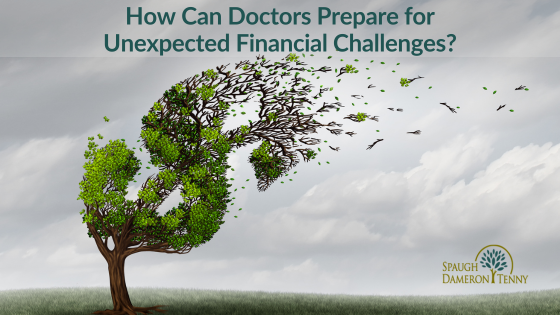As much as you plan and try to eliminate uncertainty, removing all risks from your life, financial or other, is impossible. While not all unexpected events are adverse, generally speaking, the big ones tend to affect your financial situation.
You cannot control the economy — whether the markets go up or down. A severe accident or illness, a change to your marital status, or even an unplanned expense can change your finances and throw your plans off track.
The possibility of an unexpected financial challenge means you may need to alter how you think about and handle your money. With a bit of planning and a holistic approach to your finances, emergencies and unexpected hardships can be made easier to handle when they occur.

No one ever wants to be in a situation where you need cash immediately. An emergency fund is one of the best ways to prepare for this.
Your emergency fund should be relatively liquid and cover three to six months of standard living expenses. It provides a financial cushion in case of unexpected expenses.
If you are single or a single-income family, you may want to consider building your emergency fund to cover a year's worth of expenses. Having 12 months of funds provides additional security for you and your family. For physicians and dentists, this is especially important in cases where you suffer an accident or illness and cannot work for an extended period.
The U.S. Social Security Administration reports that more than 25% of people currently in their twenties will experience a debilitating illness or injury before their typical retirement age.
In addition, only 48% of American adults say they have enough savings to cover three months of living expenses in the event they're not earning any income. This may not be your exact situation, but it's critical to consider your plan if you cannot work.
Nobody plans to get sick or hurt, but bad things happen even to relatively healthy people. Each year, you will want to ensure you sign up for health insurance and take advantage of the flexible spending account (FSA) or health savings account (HSA).
Health insurance can help protect you from unexpected, high medical costs. Typically, you pay less for covered in-network health care, even before your deductible. You receive free preventative care, like vaccines, screenings, and some "well" check-ups.
In addition, obtaining disability income insurance can help replace lost income when a person becomes unable to work due to illness, injury, and/or disability. As a doctor, you have invested substantial time, energy, and money in pursuing your career. Disability insurance coverage can help safeguard you from the potential financial devastation of a challenging health diagnosis or condition.
Life insurance is one of the most effective ways to continue supporting your family after your death.
As a doctor, you technically don't need life insurance. However, life insurance gives options to survivors. It allows your spouse to stay in the same house, continue to live independently, and not have to worry about making any immediate change based on financial needs.
Also, having up-to-date legal and financial documents is essential. An estate plan is a critical component of responsible financial management. It ensures that your assets are distributed according to your wishes and protects your loved ones when you can no longer do so.
If something tragic were to happen to you or a family member, you risk leaving those decisions up to a judge and the laws of your state if there isn't an estate plan in place.
It can be challenging to listen to or read bad news about what is going on with the economy. Instead of worrying about things you have little control over, it may be a better use of your time to focus on the things in your control.
Managing your economy is more effective than stressing about the economy. There are a few ways you can do this:
When you work with a financial planner, they can help guide you. Together, you create a strategy that takes into consideration your goals, financial situation, career, ability to handle risk, and all the other unique things about you.
Remember that unexpected financial challenges can happen to anyone, even doctors. By taking proactive steps and being prepared, you can work to minimize the impact of financial difficulties on your medical or dental career.
If you are ready to take a holistic approach to your finances, please get in touch with a financial planner at SDT. They are here to help you develop a comprehensive financial plan tailored to meet your specific needs and goals.
CRN202610-5202060
.png?width=100&height=100&name=Untitled%20design%20(16).png)
This article was written in collaboration with the financial professionals at Spaugh Dameron Tenny. Our team features CERTIFIED FINANCIAL PLANNER® professionals, Certified Exit Planning Advisors, insurance specialists, investment coordinators, and experienced analysts – all dedicated to addressing the unique financial needs of physicians, dentists, executives, and retirees. With decades of collective experience, we provide clear and comprehensive guidance in all areas of financial planning, wealth management, retirement planning, investment strategies, and practice transitions.
Finance has a reputation for being complicated, and not without reason. Like many specialized fields, it comes with its own language, acronyms, and ...
Read More →If I had a dollar for every time a new client made one of the comments below, I’d have … well, a lot more dollars.
Read More →At Spaugh Dameron Tenny, part of our role is helping clients start each year grounded in facts, not headlines, assumptions, or half-answers. When ...
Read More →